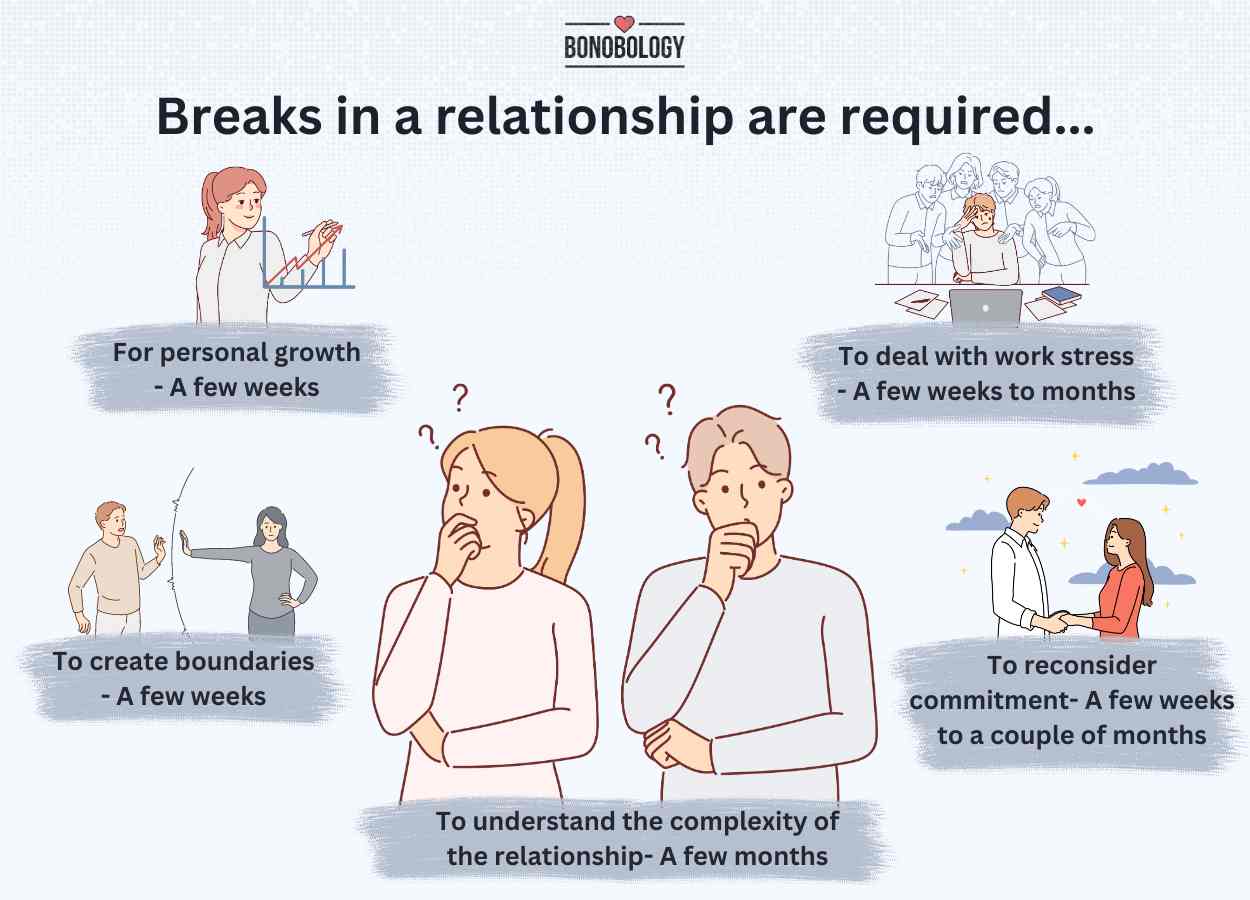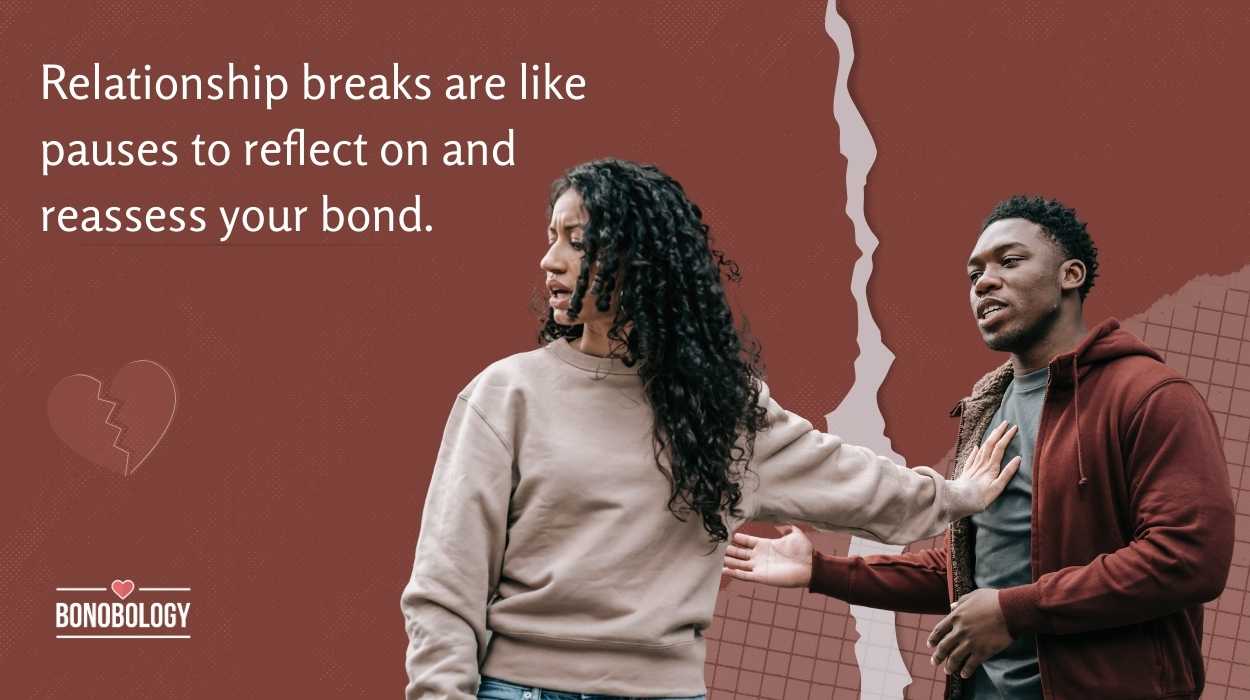Let’s face it. Relationships can be extremely overwhelming and draining at times. Especially when you and your partner are unsure of the way forward, need to gain clarity regarding your life goals, or simply need a break from each other to figure things out. But how long should a relationship break be to make things work? More importantly, are you sure your relationship will work for the better if you decide to take a break? Or are you wondering how to take a step back in a relationship and still be in touch?
In this article, we will explore such questions about relationship breaks and more, with the help of counselor Ruchi Ruuh (Postgraduate Diploma in Counseling Psychology), who specializes in counseling for issues related to dating, infidelity, marital conflict, and divorce. We will also get a gist of the relationship break rules. So, let’s not wait any longer and dive straight in to find out if hitting the pause button on your relationship is a good idea and when…
What Does Taking A Break Mean In A Relationship
Studies by the Gottman Institute suggest taking a break to avoid or better manage and resolve conflicting situations in relationships may be a good idea indeed. In fact, such studies believe you can “love smarter” when you choose to take a breather to reassess the relationship, make the relationship work, or get back on track.
But what does taking a break mean in a relationship or imply for couples? Ruchi explains, “Taking a break means one or both people in the relationship deciding to step back from the romantic aspect of the relationship but maintaining some sort of limited communication. It can also mean spending time away from your partner but regrouping for just a designated amount of time periodically.” So, in a way, breaks offer temporary respite from relationship issues.

Can a break help a relationship?
So, now we know that breaks are normal and not such a big deal in relationships. But can a break help a relationship to grow or change in a positive way, or does it harm it in the long run? Do such breaks lead to stronger bonds? What are some valid reasons to take a break in a relationship? Ruchi offers a good look at how such breaks are beneficial to relationships:
- A break allows both the individuals involved to seek and understand the relationship and assess the relationship dynamics and personal issues. It thus helps you find answers to questions such as, “Is your relationship healthy?”
- It allows for personal growth, and partners can look for nurturing themselves individually
- Taking a break can also help people in creating some sort of boundaries, be it physical or emotional, which might help them reevaluate the relationship, which wouldn’t have otherwise been possible
- Breaks allow people to spend time gaining clarity about their personal goals, values, and needs and find out if they align with those of their partners’
- Breaks also help people realize and address issues such as relationship instability that may cause the relationship to suffer in future
- Breaks can help a couple go through the sudden changes of an uncalled-for long-distance relationship due to a job change or relocation
How Long Should A Relationship Break Be — A Therapist Reveals The Answer
Now that you have the answer to what does taking a break mean in a relationship, are you wondering, “How long should a relationship break last?” A Reddit user, who has taken a break in a relationship, narrates her tale, “My husband and I took a break for 7 months. It was helpful in some ways and damaging in others… in the end we both missed our life together and decided to be back together and we are still together. I can say, I wish I would have never taken the break… there were things that we both did while apart that was damaging to our relationship now. But on the other hand… what if we didn’t take a break? Maybe we would have never started to appreciate each other again…”
In her case, the break was moderately long and lasted for months. Thankfully, it made both her and her husband realize the importance of their relationship. But how long do such breaks last really? And how long should a relationship break be for it to be impactful? Is there ‘a one size fits all’ timeline?

Ruchi says, “Breaks in relationships can last for a few days, weeks, or even months, and depends on quite a few factors. The main factor that determines the period of the break is the reason why a couple is seeking the break and their own needs and expectations from it.” She then goes on to differentiate between a few such cases:
1. A break to understand the complexity of the relationship – A few months
The answer to how long should a relationship break last can be tricky. A break that is intended to find out the root causes that are harming the relationship can last for several months.
Ruchi says, “One of the reasons to take a break in a relationship is to ascertain the causes behind trust issues or difference of values, where a couple needs to sit down and explore the issue and address the concerns.” In such cases, both the partners may need ample time for self-reflection, therapy, or even speaking to confidantes, friends, and family.
Almost everything will work if you unplug it for a few minutes… including you.
– Anne Lamott
2. Breaks for personal growth – A few weeks
A lot of people take breaks for personal growth, or to focus on themselves. Such breaks may be shorter. They may last for a few weeks. Ruchi says, “In such cases, people can go for a short solo retreat to explore themselves better before getting back with their partners.”
3. A break to deal with work-related stress – A few weeks to months
At times, as Ruchi says, “One of the reasons to take a break in a relationship may be to deal with work-related issues.” Such breaks may last anytime from a few weeks to months. They may even be longer, depending on the complexity of the work/project.
My cousin, Andrea, faced a similar issue. She felt she could not juggle too many balls at once, and decided she needed time to handle a particularly stressful time in her professional life before rejuvenating her relationship with her husband.
4. Breaks to establish boundaries – A few weeks
If a couple is struggling with boundaries, it may consist of one person having the need for constant communication, which gets overwhelming for the other person. Ruchi says, “So, if the other person can’t deal with the communication overload, they may need enough time to get back into their shell and process their feelings. This can be a short break, after which the other person gets back with enough self-reflection and new ideas to enforce boundaries in the relationship.”

5. Breaks to reconsider commitment – A few weeks to a couple of months
One of the reasons to take a break in a relationship could be the need to reassess the commitment. Couples with one partner in a perpetual commitment phobia can also take breaks. If you’re often left asking, “How long should a relationship break last?”, well, remember, in such cases, such breaks may last from a few weeks to a couple of months.
So, both partners get enough time to re-evaluate the relationship and decide whether they wish to commit long-term. Ruchi says, “Such breaks should only end when both have decided whether they are confident to go ahead with the relationship or drift apart.”
Relationship Break Rules To Make It Work In Your Favor
Sharing her reasons for going on a relationship break, a Reddit user says, “My SO wasn’t ready to commit for long term without exploring his “bachelor” side. We were apart for 2 months, and he asked for me back after going on some dates and realizing I was the shit.
“Yes, I trust he didn’t do anything else, and even if he had, that was part of the understanding. There was never an obligation to resume the relationship, but we agreed it’s what we both wanted.”
So, you see, a break in a relationship without any intention can be meaningless. Ruchi says, “There’s no use of a break if you don’t know why you’re taking it and how it can help you.” So, one must be certain of the cause of such breaks.
Here are a few relationship break rules that Ruchi shares to make such breaks work, especially if you’re in a long-term relationship. So, if you’re clueless about how to take a step back in a relationship and still make it work, read on:
- Define the purpose of the break: It’s crucial to discuss the goals, concerns, needs, and expectations associated with the break, so that both understand and are on the same page
- Set a timeline: It’s wise to not make the separation indefinite or ambiguous. Whether it should last for a week, a month, or 6 months, determine a timeline, as that will help you both gain clarity. Both partners would know when to regroup and talk about the future of the relationship
- Set boundaries: It’s very important that you communicate to each other how you want to keep in contact during the temporary separation or break. For instance, set ground rules about communication ideas, like a phone call every other day, a good morning text, or video calls. Likewise, communicate whether seeing other people is allowed
- Respect each other’s personal space and independence: While it’s important to maintain connection, you should also avoid excess communication or intrusiveness during the break. Let them pursue their personal goals and make sure that your boundaries are also respected
- Avoid misunderstandings: If you decide to go no-contact for a long time, make sure that you’ve had an open communication about it with your partner. Also make sure they don’t misunderstand a temporary break as a breakup and seek romantic solace somewhere else. Avoid misunderstandings in a healthy way
- Use the break for self-improvement: Work on personal growth and self-care. Try and achieve work goals, go on a holiday, seek therapy, spend time with friends, or pursue a hobby. But make sure you don’t waste the time the break offers
- Seek emotional support: Often one partner is enthusiastic about a break, while the other isn’t. If you’re feeling left out, because this isn’t something you wanted, seek support from family, friends, or a therapist. Seek their perspective, guidance, and emotional support
- Regroup: If needed, check on each other and regroup from time to time, even within the break, to see if things are going on track. Stay connected in some sort of way
- Understand that the relationship might change after the break: Whether it’s a brief break or a long one, be aware that when the break ends, your values, thoughts, and priorities might change. Both partners should be ready for these changes to happen. The break may make you a better person or may make you take realistic decisions not based on emotions. Be ready to accept the change to avoid shock and take care of your mental health. You can opt for couples therapy if you want.

Key Pointers
- What does taking a break mean in a relationship? It implies hitting ‘pause’ on the romantic aspects and taking time apart to focus on the bigger picture
- A break in a relationship can make or break the relationship in the long run
- How can a break help a relationship? By allowing for personal growth and the time and space to comprehend the relationship
- How long should a relationship break be? It depends on the couple and their intentions
- Some clear rules to be followed in relationship breaks are: defining the need for the break, being on the same page, setting boundaries, and avoiding misunderstandings
Relationship breaks can work like magic in some cases. But if not handled properly, they may lead to permanent cracks even in a healthy relationship, eventually leading to the relationship ending on a sour note. The success of a break depends on a lot of soul-searching and introspection.
Blaming the other person for all the relationship issues isn’t going to work. Instead, pausing the relationship to realize the real issues plaguing the relationship can be beneficial. After all, what’s the point of a break if it doesn’t reveal a few things about you and the relationship. We hope, through this article, we have been able to answer your burning questions such as “How long should a relationship break be?” or “Do relationship breaks really help?” Remember, it’s eventually you and your partner who are to decide the terms and length of the break and how to take a step back in a relationship and still get back together.
Your contribution does not constitute a charitable donation. It will allow Bonobology to continue bringing you new and up-to-date information in our pursuit of helping anyone in the world to learn how to do anything.





